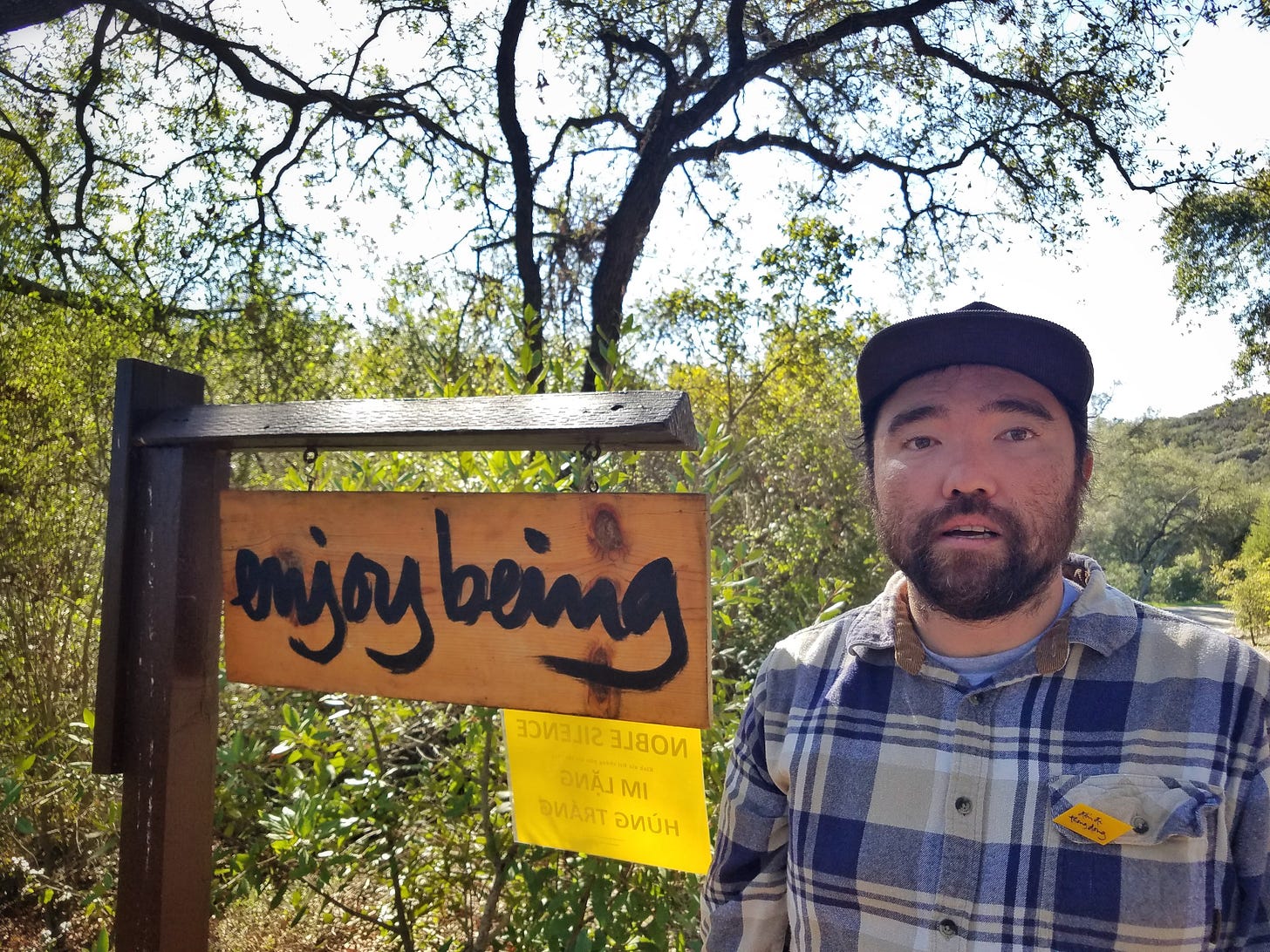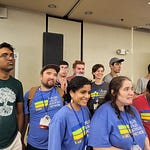Tara: Just a quick note from me: as you might know, if you follow Danny's blog or social media, he did break his arm, his right arm, quite badly last week and had surgery for it over the weekend. The surgery went fine, but of course Danny is pretty unhappy and uncomfortable. He feels ashamed that the broken arm is kind of a result of him tripping while sprinting and jumping around in a very dysregulated state. So in that sense, it's very apropos for me to have this brief note on this episode where we talk about regulation. But we recorded this episode about two weeks before this accident. So just letting you know this little update and also informing you that the Danny you hear in this episode is not the Danny who is coming to terms with needing to operate with his left arm. And he's doing a great job of it. Alright, that's it. Back to the episode.
[Instrumental intro]
Danny: Hello and welcome to All Our Brave Hearts!
T: Yeah, hi everybody. Welcome. It's nice to be back!
D: It sure it!
T: Since it's been a little while, and maybe for those who aren't so familiar, this is a podcast by Danny Whitty, a non-speaking author, advocate, overall amazing person, and me, his sister Tara. The aim of this podcast is to basically promote the idea that everyone's lives would be improved with more empathy and more shared understanding. And in this particular season, I guess, let's say we're starting season two around now, Danny really wants to highlight the fantastic, amazing, inspirational stories of non-speakers like him.
I don't know if you can hear, but Danny is stimming a little bit. He's a little bit uneasy, not feeling great in his body, but he wanted to record this. And I'm going to prompt him to bring his body back here. You want to come back here, Dan?
D: I communicate using Spelling to Communicate (S2C) and I am so lucky to have the best CRP in my sister.
T: Thanks, Danny! So CRP is Communication Regulation Partner, and that's the role I play in this in this communication duo. As you have heard already in this episode, Danny will often read aloud his words as he spells them. But that can take a lot of energy, so more often than that, I will read his words as he spells them out. But for the bulk of the podcast, he has chosen a text-to-speech voice to read his prepared remarks. This is a kind of unusual, let's say, collection of modes for reading aloud spellers' words (“spellers” are what we call people who use S2C, Rapid Prompting Method, Spellers Method, etc.). But Danny likes to keep it low-tech and use a laminate board for most of his live communication, whereas many of his peers will use a keyboard with text-to-speech all the time. Anyways, that's enough explanation of that. If you want to learn more, we do explain a little more in depth in our earlier episodes.
Danny, you want to bring your body back? Yeah, sorry you're feeling on edge today. But it's pretty fitting with today's topic, right?
D: Totally. But first : What is something brave you have done lately?
T: For those of you who are new, we ask each other this question at the beginning of each episode. So something brave I've done lately... this is kind of an ongoing process. So, I do spend a lot of my time working of course with Danny, and I'm a certified S2C practitioner working with several non-speakers here in Southern California. But my other career is as a marine conservation consultant. And I have basically found myself in a situation where I haven't procured any contracts for the near future… and that's actually kind of a good thing, because I have some passion projects that, as yet, I have no way of monetizing. But I really want to invest in them, so the great thing I'm doing is giving myself a few months to really focus on those and to hope that my savings account doesn't take too big of a hit
And it's actually pretty exciting, even though it is also a little intimidating. So that's the brave thing I'm doing lately. How about you, Danny?
D: That is so exciting.
T: Thank you! I’m excited, Danny.
D: I am proud of you.
T: Thanks, Danny. That means a lot, hun.
D: For me, I would say, something brave is that I’m doing the opposite. I am choosing to slow down a bit and to let my ambitions rest for a while for a while, because I feel like a slower pace is what I need these days.
T: Yeah. I think that's a brave thing to do as well. And we had some conversations about this, because I wanted to make sure that Danny wasn't doing this just because he could sense that I was about to be busy. And I wanted to make sure you weren't kind of cutting yourself off from doing things you really want to do, just because you knew I was about to be overextended.
But you seem pretty content with your decision to just chill a little more. And the timing's great for our joint schedule, since I'm really wanting to dive into my passion project. I think it's great that we're easing up. We had such an intense year or so together during our first several months of being fluent during lockdown, and we've been trying to calibrate a sustainable schedule since.
D: I totally need to take it easy, because I want to appreciate life without putting so much pressure on myself.
T: Yeah, that's very wise, Danny. I love it.
D: I love it so far.
T: Although that said, Danny, you “taking it easy” is still you doing your social media posts and this podcast and your work with Spellers and Allies Advocacy Network and going to day program and helping mom around the house and in the garden. So even slow-paced Danny is still doing a lot.
D: I guess so So let’s dive in!
I want to share about what I experience when I try to regulate myself. By this, I mean how I work to de-escalate my dysregulation. It is a lot of work!
The main thing to know is that I never want to be dysregulated. It is intensely stressful and I hate it. So a s unpleasant as it is for others who are around me, I promise that it is even worse for me.
Therapy has helped me immensely. It has been a lot of effort to incorporate lessons from therapy into my practice in daily life. But it has made a huge difference over time.
Mindfulness has also helped me. It fits nicely with my lessons from therapy. It is a powerful approach to gaining insight into my mind and body, and into how to cultivate mindsets that help with regulation.
T: Yes, Danny, I love that you've found mindfulness to be so helpful. It's been really important in my own life as well. When I first really started learning about it was with a book by Thich Nhat Hanh, the Buddhist monk, thinker, and author. His book, The Sun, My Heart, was my main introduction, and it really changed my life for the better.
Mindfulness is an ongoing journey. I definitely haven't mastered it, but it's really given me so much perspective in my life. It’s helped me adapt, to just be more peaceful and resilient, and also empathetic. It was so cool to share what I've learned about mindfulness with you when you first expressed interest in it. And it's been really cool to see you and our mom really dive into it and both of you finding it helpful.
And what you say about how your dysregulation, externally, can be challenging for everyone in the support team, everyone who's around you, but you are the one who is suffering the most from it: keeping that in my mind, being mindful of that, and also being mindful of my state of being while you are enduring the dysregulation has helped me basically respond in ways that are less counterproductive. I'm not perfect at it, you know that for sure, but I definitely feel like it allows me to respond in better ways.
D: I totally agree. And you are so mindful.
T: I'm glad to hear that.
D: It is so good to learn from you.
T: Thank you, Danny. That means a lot. I learned from you, too. And for those who maybe haven't yet taken a dive into mindfulness, it's really important to strip away this veil of inaccessibility (that didn't even make sense), but to make very clear that mindfulness is a practice. It’s not something that one expects to master quickly or ever.
It’s kind of like how I've often heard people say, “oh, I couldn't do yoga, I'm not flexible.” And, it’s like: no, no, no, you do yoga in part because it helps you become flexible. Same with mindfulness. Like, “oh, I don't know how to meditate” or “my mind is too busy.” And: mindfulness is a tool by which you work on those things, right?
D: Exactly.
T: Mindfulness is not necessarily the same thing as meditation. It's stopping to take a breath and just pause and assess how you're feeling in your body, and how that's influencing your emotional state, or vice versa. It's stopping to gather your thoughts, and maybe to imagine or relate to what someone else might be feeling or experiencing and cultivating empathy in that way. It's, again, taking a pause and thinking about what are other ways this situation or experience could be interpreted or responded to.
Danny has a big smile!
D: I love thinking about how to be more mindful in my life.
T: That's a great practice to have in your life: to never assume you've mastered mindfulness and to keep seeking it in ways that help you have a better quality of life and better well-being.
D: Learning more about mindfulness with my mom has been so helpful for both of us as we co-regulate during my dysregulated times. That is not to say that it is easy. But we are getting better at it.
T: Yeah, it's been so cool to see our mom, who's in her mid-70s, learning and enjoying the process of learning new things about mindfulness in ways that she really marvels at. It's also obvious how much it's helped you in your regulation, Danny, in addition to helping those of us on your support team.
D: It's so remarkable indeed. So remarkable indeed!
T: Yeah. And it's like a muscle that gets stronger as you practice more. For those of you who are like, “I don't know how to meditate” or “I could never meditate”: that doesn't mean that mindfulness isn't for you. Actually, it probably means that it could be really helpful for you to engage in it.
D: Totally. And I have more tips on that, but not for now.
What I want to focus on is my inner, lived experience when I am trying to stay regulated. Even when I seem outwardly calm, I often am whirring away in my mind trying to keep it together. It is a lot of effort. Even my baseline can be exhausting. This is why I need plenty of downtime.
T: Yeah, that's been something really important for us as your support team, as your family, to realize: at your baseline, you are handling more, working more, than we are at our baseline. We've always known that you fatigue more quickly than we do in many cases, and having this understanding of all those processes that are going on in the background for you even while you're at “rest” really helps us understand and be better at assessing when we should schedule break time for you.
When you said, for example, “I really need this hour or perhaps even more before I shower at night to just decompress” - that was really good for us to know to let you have that time and not bug you to do things with us or to do things around the house. It's not idle time (not that there's anything wrong with idle time). It's a very important part of your maintenance.
And I've heard other spellers say the same thing, especially once they gain fluency and their families are super excited to get them active and involved, and the spellers themselves are super excited to get active and involved. Sometimes that decompression and rest time can get forgotten in a way that actually ends up contributing to that speller feeling a bit burned out. So, indeed, that's very important.
And there's some really good research being done. I believe it's at Rutgers University by the lab of Dr. Elizabeth Torres. Danny's actually involved in some of it, studying regulation-related physiology - kind of, what the heart rate and facial movements are of non-speaking autistic folks at rest. Did I explain that okay? You know much more about it than I do. You and mom are the ones involved.
D: Good enough!
When it is a more stressful time, I need to spend even more energy on staying regulated. Yet I have less available energy because I am also processing the stress, be it physical or emotional or a combination. Plus I pile on stress about being dysregulated. I worry about what I will do, and how exhausting it will be, and how long it will last.
It is so much to handle! It is so awful. It is like a freight train, or a sudden thunderstorm, or a tsunami. It is so scary.
The main things I have been working on are around my anxieties over being dysregulated. It has been so helpful to release some of that created stress. That extra layer of anxiety is so powerful.
T: Yeah, going back to what you were saying about when your body's already under stress, it's dysregulating, and that also means you have that much less energy to regulate yourself, because you're busy processing or coping with that stress. It's kind of like how, you know... neurotypical folks might experience “hanger”, or when we're tired, you know, we obviously often have less patience, feel like we have less resilience. That's exactly what you're experiencing, although I imagine in a much more intense way.
It's also good for support teams for be like, “hey, we're tired today, or we haven't eaten well today… we might find it harder to be the best support people we can be,” as well.
D: Absolutely. That is so important.
T: And what you're saying about, basically, the anxiety over dysregulation: it's your anxiety over anxiety. I do that myself. It doesn't affect me as extremely as it does you. But yes, it's kind of funny: having the anxiety itself is tough enough, and then some of us are more prone to being worried about the worries.
I read recently in another Thich Nhat Hanh book, I think “No Mud, No Lotus”, that they call that the “second arrow.” So you're already injured by one arrow, which is the actual cause of the worry, and then we inflict upon ourselves a second arrow, which is that created worry.
D: I have like ten arrows!
T: Oh, that's a lot of arrows, Danny. Yeah, when I read that, I was like, I feel like maybe I have three, but ten! Well, we gotta help you get rid of some of those arrows.
D: I'm working on it
T: One thing that's helped is cultivating acceptance. And again, acceptance doesn't mean complacence that say “oh, I'm okay with the situation and I'm not going to do anything to change it.” That's not what acceptance is. Acceptance is cultivating equanimity and being like “okay, this is the situation” and assessing the elements that you can change and then the elements that you can't and that you have to find some way to cope with.
A good friend of ours, when she was a new mom and you know dealing with that long stretch of not having very much sleep, said someone gave her the advice that: accepting the fact that, on any given night when the baby's crying and you're thinking, “oh, how many hours of sleep am I ever going to get?” - accepting the fact that the next day is probably not going to be very pleasant - you're probably going to feel pretty rough the next day – and okay, that's it. That helped her so much.
Instead of dreading how tired she was going to be the next day and anguishing over how little sleep she was getting, it was just kind of being pragmatic. Like, yeah, this is tough. Tomorrow's going to be tough. This all shall pass.
D: I love that! It helps me so much. It helps me so much!
T: When you've had those sleepless nights, sometimes it is very intense. You are very active in your body, moving around, with a lot of shouting. But that's gotten, I think, less and less. More and more, you've been able to, even if you can't sleep in your room, you're able to at least sit on the couch and read a magazine and be restful in that way. I know you said it was really helpful when we stopped focusing so much on “let's help Danny get to sleep” and just instead saying “let's help Danny try to get some rest.” That took the pressure off of entering that state of sleep but still gave us something that would be helpful for your body and mind, and that would be more feasible.
D: It helped immensely
T: Yeah. It was noticeable from the outside how much it helped.
D: It is such a relief to not force myself to try to sleep.
T: It even helps me in my personal life as well. Being like, “okay, today wasn't a great day” or “I didn't get much sleep because I was up late working” or “I have an early morning flight” and instead of dreading how miserable I'm going to feel because of it, just being like, “it's going to be rough, but that's okay.”
D: That is right.
T: And this is not to minimize things. I know for many non-speakers and their families, including Danny, intense dysregulation can last for days or weeks or even longer. It can be intensely profoundly stressful, and it's not necessarily something you can shrug your shoulders at and kind of “acceptance” your way out of. But there are many cases in which it can be helpful. We still run into situations where we're in over our heads and we're overwhelmed and don't react in the most mindful ways. But there's so many other situations that have improved because we're able to do that
D: Thank you for clarifying that.
That is it for now. I could talk on this for a long time. But it is enough for now to introduce a bit about my experience and what has helped me.
T: Yeah, Danny, I'm so glad you wanted to talk about this in this episode. Not only do I think your fellow non-speakers will really appreciate this perspective being shared more widely, but speaking as your sister and support person, I can imagine that many other family members, other support people who maybe are less familiar with the words of spellers, or who are newer to accessing the words of spellers. will find this really informative. And this will help them adapt as support people in ways that are helpful, not only for the speller, but for everyone involved.
Thanks for bringing this up and I would love for us to do more episodes on regulation and dysregulation in the future.
D: I'm happy to do so.
T: I'm glad you're happy to do so.
D: It is such an important topic. I also want to recommend you all check out my friend Noah Sebeck on social media. He is a regulation guru and speller.
T: Yes, great recommendation, Dnny. It’s @quirkthriveswithnoah. Quirk Thrives is his business through which he mentors other scholars and families, I believe, through trauma and various approaches to regulation, and he's fantastic.
D: Totally a quirky guy.
T: He is. You guys all are in that friend group. You're funny.
D: I am so glad to share this topic with all of you. Take care, brave hearts. See you next episode. Bye-bye!
















Share this post